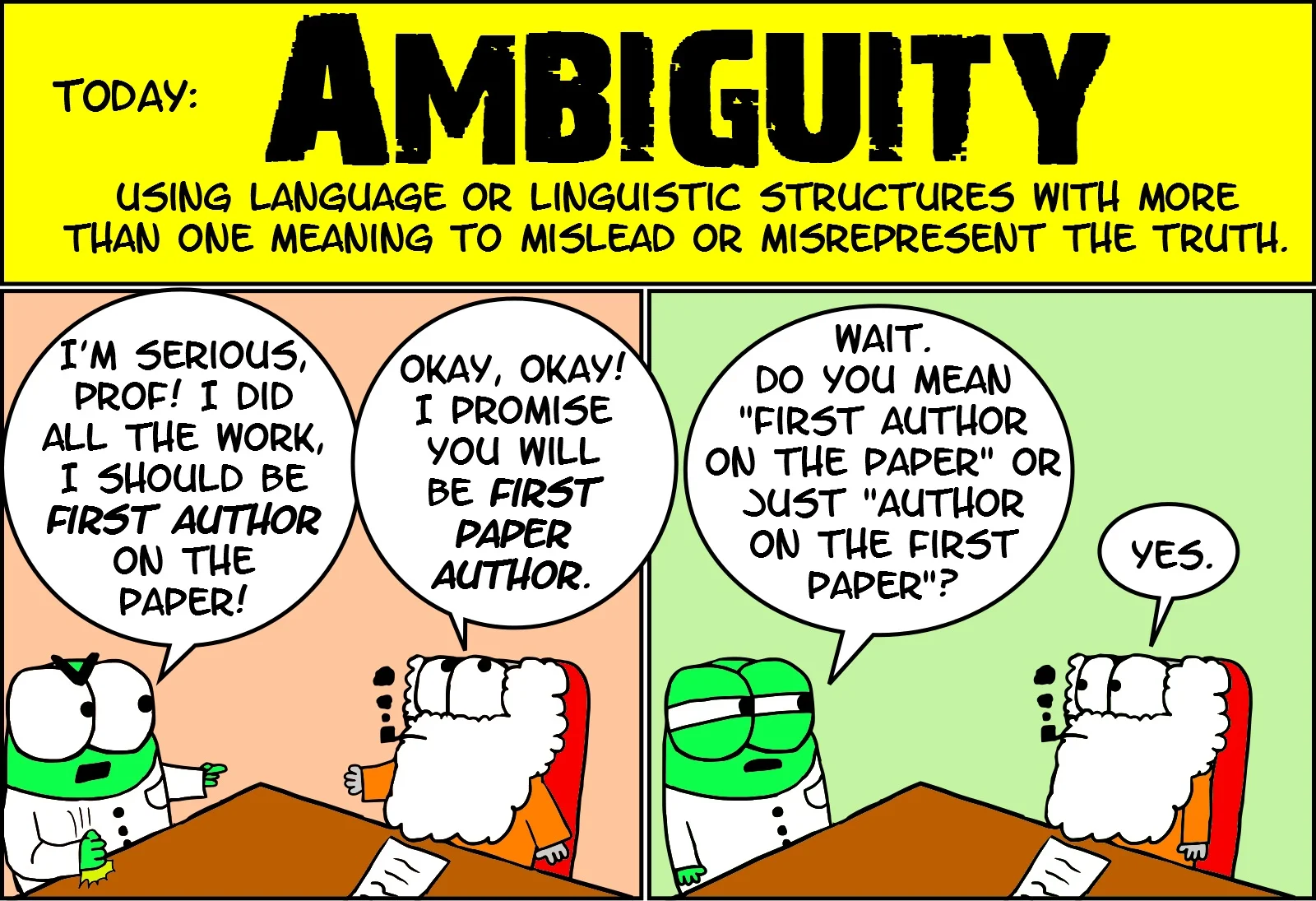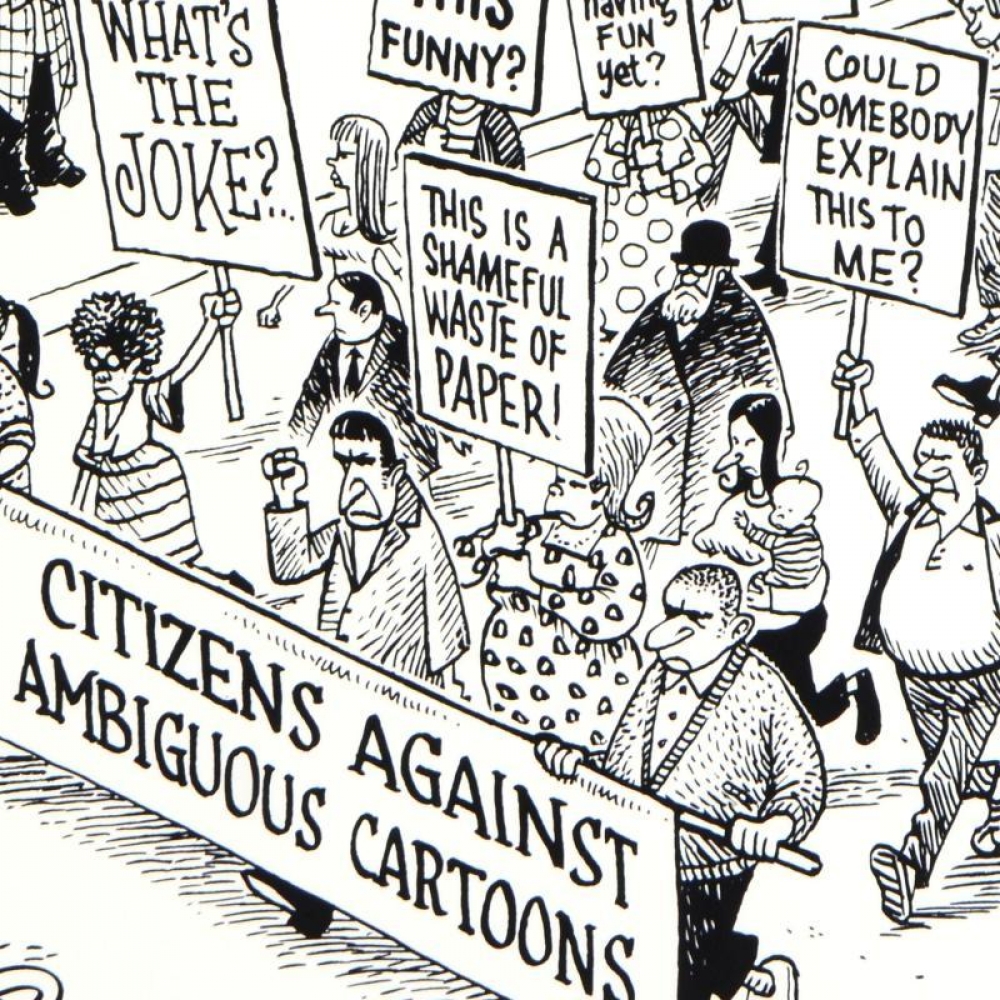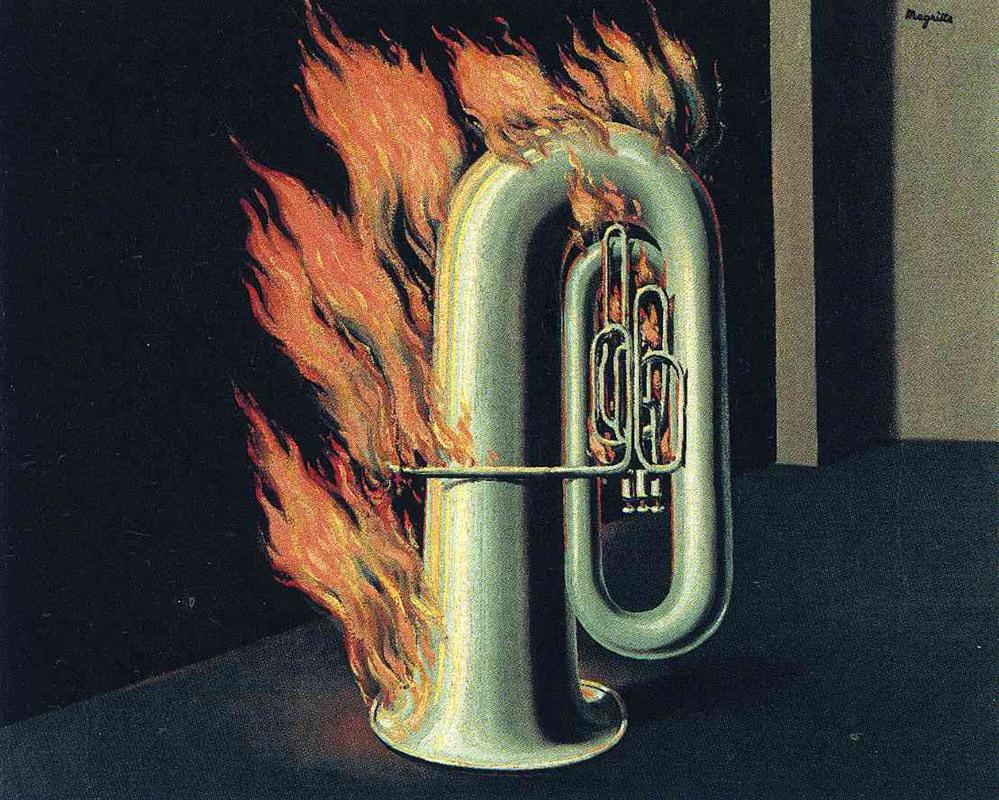By The Landlord
“I look for ambiguity when I'm writing because life is ambiguous.” – Keith Richards
"Neurosis is the inability to tolerate ambiguity." – Sigmund Freud
“A smile is the chosen vehicle of all ambiguities.” – Herman Melville
“The ideal art, the noblest of art: working with the complexities of life, refusing to simplify, to ‘overcome' doubt.” – Carol Joyce Oates
“The greater the ambiguity, the greater the pleasure.” – Milan Kundera
“Ambiguity is the devil's volleyball." – Emo Philips
Ambiguity is life’s blessing and curse. But which is it? Both? Neither? Ambiguity runs through our lives like a message through a stick of seaside rock. Except that the words in the message have more than one meaning, and it might change in the middle. Ambiguity is Schrödinger's cat that may or may not be in the box; it's the particle and wave that pass simultaneously, it's the differing interpretation of behaviour, a look, a smile, a word, and throws up questions such as - will you still love me tomorrow? It’s that uncertain smile. It's a state of delicious uncertainty and doubt that keeps us all worried and hungry. No wonder then that it quite unambiguously energises so much that goes into songwriting.
Previously there has been a topic of songs that have misunderstood or misrepresented, or are not as they seem, deliberately or otherwise, but this week we're focusing not so much on songs that have fallen fowl, or fair, of ambiguity, but are actually about ambiguity - where the narrator, or the storyline centres or touches upon the ambiguous - whether that is a situation, a relationship, feelings or other perceptions of the truth. Or just stupid jokes:
Had to air this one …
So this week’s songs nominations shouldn’t only be examples of ambiguous lyrics, but songs in which ambiguity is at least in part, the subject of the song too, whether that is something that’s said, done, appears, or is imagined.
Ambiguity comes in words, but also actions, thoughts, appearances, memories, feelings. But essentially it is defined as when the meaning of a word, phrase, or sentence is uncertain. It might be deliberate, or accidental.
It can be both lexical (different meanings in one word), or syntactic (governed by an uncertain structure of sentence). “I shot an elephant in my pajamas,” said Groucho Marx in a surreal, mischievous mood, illustrating both but who was wearing the pyjamas, and when he says shot, could he mean photographed? Call me a taxi? But that’s not my name, nor am I a vehicle to give other people lifts.
“O Rose thou art sick / The invisible worm / That flies in the night / in the howling storm / Has found out thy bed / Of crimson joy / And his dark secret love / Does thy life destroy.” wrote William Blake in The Sick Rose. But why is Rose capitalised? It that stylistic, or deliberately ambiguous? is the worm also another kind of hole-entering entity? Is the bed not necessarily soil? Is the crimson joy, not necessarily flower petals? Poetry is rich in ambiguity, often through metaphor.
Perhaps the best known work on the subject is the poet and literary critic William Empson’s Seven Types of Ambiguity, a forensic analysis of the subject, filled with copious literary examples. Let’s not get too bogged down in it here, but some of his key remarks include that "the machinations of ambiguity are among the very roots of poetry,” and that “an ambiguity, in ordinary speech, means something very pronounced, and as a rule witty or deceitful … any verbal nuance, however slight, which gives room for alternative reactions to the same piece of language.”
Nuance and ambiguity may be the stuff of artistic endeavour, but in theory has no place in other more regular parts of life. These might include the law, engineering, or medicine for example, or indeed business, and increasingly on the internet, where data and commerce are paramount where ambiguity is too fuzzy for actual, essential transaction or delivery, or indeed review or opinion. So in a prim and properly done world where money, health and politics are concerned and at stake, and the wellbeing of nations matter we don’t want ambiguity. We want certainty. “There is no greater impediment to the advancement of knowledge than the ambiguity of words,” wrote the 18th-century philosopher Thomas Reid, with serious logic. So there’s no room for ambiguity in science. Or is there?
Science has no place for it …
But shady dealings in business, and especially politics, use ambiguity in language and behaviour constantly. You only need to listen to the language of any prospective prime minister to perceive this. As the sleazy schemer and former Tory minister Alan Clark put it, he was just being “economical with the actualite”, an early pioneer in the concept of confessed alternative facts. Even Abraham Lincoln was wary of having to constantly clarify his position, because he knew of the necessity to be agile in politics,” he said.
“Governments have always been wary of the arts because they're wayward and ambiguous and because they deal with feelings rather than facts.” said the director Richard Eyre, although there’s no shortage of creativity in parliaments and Congress.
Ambiguity? Down with this sort of thing …
However in language and art, in order to express in inexpressible, ambiguity is almost essential. The definite has ho real place in art, you might say, and few are better than showing this than Rene Magritte:
Magritte’s The Discovery Of Fire
Rene Margritte’s La Pensée visible
So then, let’s now turn do ambiguity as perceived by musicians not merely with words but with the music itself. Here’s Felix Mendelssohn turning the topic on its head: “People often complain that music is too ambiguous, that what they should think when they hear it is so unclear, whereas everyone understands words. With me, it is exactly the opposite, and not only with regard to an entire speech but also with individual words.”
Jean-Michel Jarre has now arrived with a rack of keyboards and explains that his genre is not about words, but with society and technology. The whole 'Electronica' project is about the ambiguous relationship we have with technology: on the one side, we have the world in our pocket; on the other, we are spied on constantly.”
And now Donovan is in the bar, explaining the entire thought process behind his songwriting: “The songs I write are about searching, and they're ambiguous - always to be understood in different ways.”
So much of ambiguity is also about image. Here’s Roisin Murphy talking about one her best-known albums. “On 'Hairless Toys,' I've tried to create an ambiguous character to go with an ambiguous record. She's anything but rock n' roll - she's so not rock n' roll that, in a twisted way, she's kind of radical. She's like someone from my memory, almost like my mother, and she's lost in some space-time between the 1960s and the late ‘80s.”
Lost in ambiguity? Also in the bar we’ve got the former guitarist Lindsey Buckingham. Describing the peak of the band’s success, he shrugs his shoulders and says “those 12 years, they were ambiguous at best,” though he may be using the word to describe the haze of drug madness. Still, you’ve got to keep rockin’:
Classic …
Annie Lennox’s career was very much launched with particular look that some perceived as sexually ambiguous. “I was perceiving myself as good as a man or equal to a man and as powerful and I wanted to look ambiguous because I thought that was a very interesting statement to make through the media. And it certainly did cause quite a few ripples and interest and shock waves.” And yet surely her look was very much inspired by David Bowie, a foremost figure of sexual ambiguity?
Annie Lennox. A image that’s sexually ambiguous, or sweet dreams made of David Bowie?
Bowie - early pioneer of rock ambiguity and androgyny
Another form of ambiguity is often described, at least in the acting industry, in terms of racial identity. Now in her new role as royal princess, Meghan Markle is here to describe it in her place in the machinations of TV and film: “Being 'ethnically ambiguous', as I was pegged in the industry, meant I could audition for virtually any role. Morphing from Latina when I was dressed in red, to African American when in mustard yellow, my closet filled with fashionable frocks to make me look as racially varied as an Eighties Benetton poster.”
Actors do thrive on playing with ambiguity, and there’s a big crowd of them gathering on our premises. Nicolas Cage is at the front of the queue. “The best characters are the ones that somehow manage to be both attractive and repulsive at the same time. If you do that, you're at the centre of the universe - if you can find characters who are more ambiguous and can raise more questions than answers,” he shouts, then whispers.
“I think great art is always ambiguous and can't be pinned down,” adds Stephen Rea, perhaps in reference to the film The Crying Game, in which he falls in love with a woman who turns out to be a man.
“As an audience member and as an actor I much prefer to find ambiguity,” says the ever-changing Michael Fassbender.
“Well, I tend to always love material with flawed protagonists and morally ambiguous people.” says Laura Dern.
Morally ambiguous is another term that describes many of the most potent characters in fiction, film, or real life. The likeable rogue, the anti-hero. ““He prizes ambiguity; he loves to keep you guessing,” writes Lionel Shriver about the evil teenager in We Need to Talk About Kevin, of course made into a film.
“A modern hero is very ambiguous. I went through some very rough times in Czechoslovakia - the occupation by the Germans at the end of the war. We had people going against their tanks with brooms. Are they nuts, or are they heroes?” adds One Flew Over The Cuckoo’s Nest director Milos Forman.
Endings are also key to much art, not only in songs, but also film. “I left the ending ambiguous, because that is the way life is,” recalls Bernardo Bertolucci when asked about his film La Luna at a screening in 1979.
The Coen brothers are masters of the ambiguous, not only in the ending, but at any time. Here’s Joel: “The question is: Where would it get you if something that's a little bit ambiguous in the movie is made clear? It doesn't get you anywhere,” he explains.
At the end of Barton Fink, for example, after the fire in the hotel, set off by the serial killer salesman Charlie Meadows (John Goodman) the writer Barton ends the film with a box whose contents are unknown, on a beach staring at a woman who looks awfully like the one in a poster in his now-destroyed hotel room.
And is there any more tantalising ambiguity than Javier Bardem as the psychotic killer’s behaviour to an unwitting shopkeeper in No Country For Old Men, tossing a coin, and looking at a uncoiling wrapper?
Or indeed the famous, sudden (death?) ending of The Sopranos?
“As long as there have been men and they have lived, they have all felt this tragic ambiguity of their condition, but as long as there have been philosophers and they have thought, most of them have tried to mask it,” said Simone de Beauvoir.
Writers are the really the puppet masters of ambiguity. “I would like to provoke ambiguous responses in my readers.” James Ellroy.
There are so many examples that intrigue and frustrate. In Great Expectations by Charles Dickens, for example, what are we to think of Pip’s last line? “I saw no shadow of another parting from her”? Or is the inspector really an inspector a the end of JB Priestley’s An Inspector Calls. Or In Life of Pi by Yann Martel, lying in a hospital bed in Mexico, Pi tells two different versions of his story to the police officers. But when he asks them which they prefer, are they animals or humans? That is the magic of literature, of language, and ambiguity.
Time to sign off with a song example to set the ball rolling, here’s an old one by R.E.M., The Wrong Child. It is speculated that the outsider narrator is likely a disabled child watching others play, but nothing is definite, and what I like about it is the music, with the chords suspended, leaving a feeling of the unresolved.
So then, I’m delighted to unambiguously announce that this week’s wise overseer of the ambiguous and umpire of uncertainty is the masterful magicman! Place you song nominations in comments below for last orders on Monday 11pm UK, for playlists published on Wednesday. Of that, at least, there is no doubt …
New to comment? It is quick and easy. You just need to login to Disqus once. All is explained i in About/FAQs ...
Fancy a turn behind the pumps at The Song Bar? Care to choose a playlist from songs nominated and write something about it? Then feel free to contact The Song Bar here, or try the usual email address. Also please follow us social media: Song Bar Twitter, Song Bar Facebook. Song Bar YouTube. Subscribe, follow and share.









